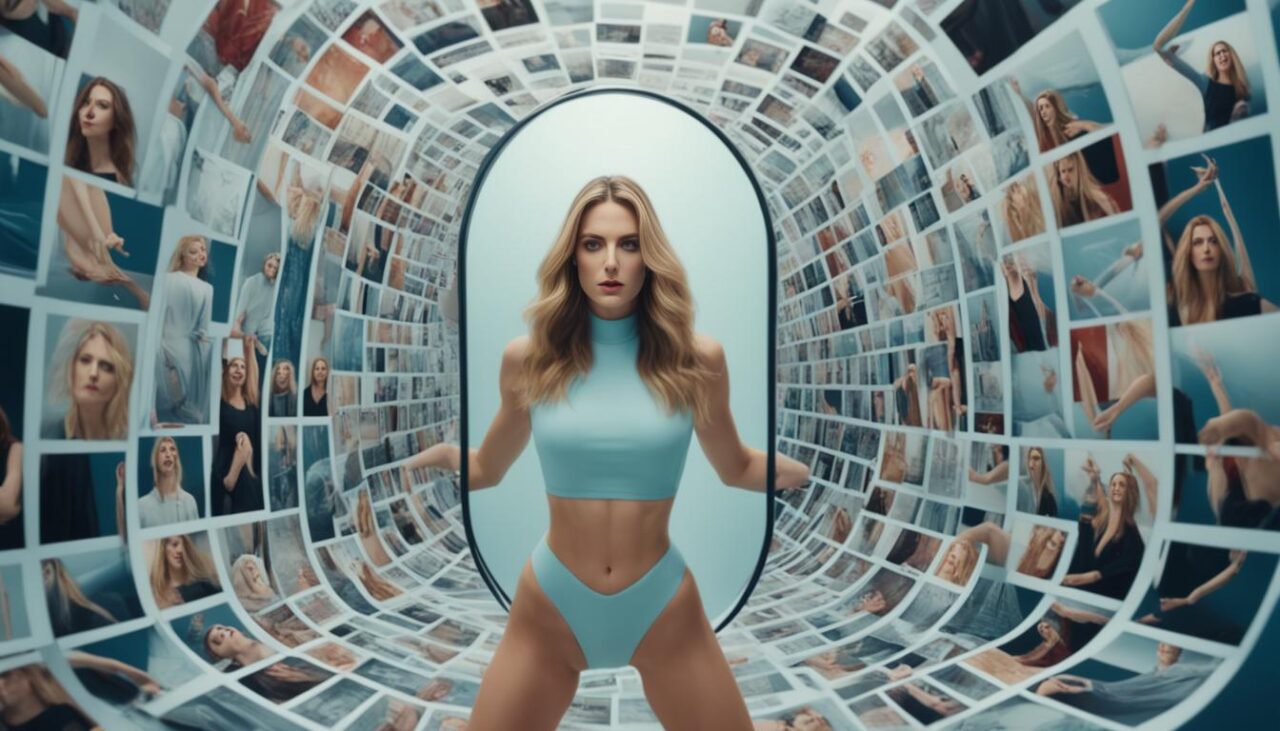Welcome to our comprehensive exploration of the profound influence of media beauty standards on mental health, body image, and overall wellness. In today's visually-driven world, beauty standards presented by the media play a significant role in shaping our self-perception and psychological well-being.
As we dive into this subject, we will uncover the psychological effects that beauty standards imposed by the media have on individuals. We will examine how these standards contribute to the formation of body image and influence self-perception.
It is crucial to recognize the impact of media on mental health. Exposure to unrealistic beauty ideals can lead to negative psychological effects, creating an environment that may be detrimental to our overall well-being. Throughout this analysis, we will dissect the connection between media beauty standards and mental health.
Finally, we will provide actionable strategies to promote a healthy self-perception and enhance overall wellness. Our goal is to empower individuals to navigate media beauty standards while fostering a positive body image and maintaining good mental health.
To illustrate our points visually, we have included an image below that reflects the essence of beauty standards and its impact on body image and self-perception.
Join us on this enlightening journey as we uncover the effects of beauty standards imposed by media and embrace self-acceptance in pursuit of good mental health and well-being.
The Role of Media Beauty Standards in Shaping Body Image
Media beauty standards play a significant role in shaping how individuals perceive and evaluate their own bodies. The portrayal of idealized beauty in mainstream media can have profound psychological effects on body image and self-perception.
Through carefully crafted advertising campaigns, television shows, movies, and magazines, the media often sets unrealistic standards of beauty that are unattainable for the majority of people. These standards perpetuate a narrow definition of beauty, which can lead to negative self-perception and dissatisfaction with one's own body.
Research has shown that exposure to media beauty standards can influence body image and contribute to the development of disordered eating behaviors, such as restrictive dieting or excessive exercise. Comparing oneself to airbrushed and photoshopped images can create feelings of inadequacy and low self-esteem.
The psychological effects of media beauty standards extend beyond body dissatisfaction. Individuals who internalize these standards may experience anxiety, depression, and social withdrawal. The constant pressure to conform to societal ideals can take a toll on mental health and overall well-being.

“The impact of media beauty standards on body image should not be underestimated. It is essential to understand how these standards shape our perceptions and work towards promoting a healthier, more inclusive representation of beauty in the media.” – Dr. Emily Thompson, Psychologist
It is important to recognize the influence of media beauty standards and to develop strategies to mitigate their negative effects. Building self-esteem and practicing self-compassion are crucial in cultivating a healthy body image. Surrounding oneself with diverse representations of beauty and challenging societal norms can also contribute to a more positive self-perception.
By fostering a critical mindset towards media beauty standards and promoting a culture of body positivity, we can empower individuals to embrace their unique beauty and cultivate better mental health and overall wellness.
Media Influence on Mental Health
The media's pervasive influence extends beyond shaping body image; it also impacts mental health. Constant exposure to unrealistic beauty ideals can have significant psychological effects, leading to detrimental consequences for overall well-being.
Research suggests that consuming media content that promotes narrow beauty standards can contribute to feelings of inadequacy, low self-esteem, and body dissatisfaction. Individuals compare themselves to the idealized images portrayed in the media, often leading to negative self-perception and increased vulnerability to mental health issues.
The psychological effects of media beauty standards are multifaceted and can manifest in various ways. For some, it may result in the development of body dysmorphia, a mental disorder characterized by a distorted perception of one's appearance. Others may experience anxiety, depression, or disordered eating patterns as they strive to conform to societal ideals.
Exposure to unattainable beauty standards portrayed in the media can negatively impact individuals' mental well-being, contributing to a harmful cycle of comparison, self-criticism, and diminished self-worth.
It is important to recognize that media's influence on mental health is not limited to body image alone. Advertisements, TV shows, and social media platforms often perpetuate unrealistic portrayals of happiness, success, and lifestyles, further exacerbating feelings of inadequacy and dissatisfaction.
Addressing this issue requires a holistic approach, including media literacy education, promoting diversity and inclusivity in media representations, and cultivating self-compassion and self-acceptance. By challenging unrealistic beauty ideals and cultivating a positive media environment, we can contribute to fostering healthier mental states and overall well-being.
The Power of Media Literacy
Developing media literacy skills is crucial in navigating the media landscape and minimizing its negative impact on mental health. By engaging critically with media messages and understanding their underlying motives, individuals can develop a more discerning perspective and make informed choices about the media they consume. This includes being aware of the potential manipulation techniques used in advertisements, the unrealistic standards often portrayed in TV shows and movies, and the curated nature of social media content.
Promoting Authentic Diversity
Increasing the representation of diverse beauty standards in media is essential for promoting positive mental health outcomes. Encouraging inclusivity and showcasing a range of body types, ethnicities, ages, and abilities can help individuals develop a more realistic and inclusive perception of beauty. This can lead to greater self-acceptance, improved body image, and enhanced overall well-being.
Fostering Self-Compassion
Building self-compassion and cultivating a positive self-image are vital in counteracting the negative impact of media beauty standards. Encouraging individuals to practice self-care, celebrate their unique qualities, and focus on their intrinsic worth can help protect their mental health and promote a healthy self-perception.
Moving forward, it is essential to challenge and redefine the beauty ideals perpetuated by the media. By understanding the media's influence on mental health and actively working towards creating a more diverse, inclusive, and compassionate media landscape, we can support individuals in developing healthier relationships with themselves and others.

Promoting a Healthy Self-Perception and Wellness
Despite the influence of media beauty standards on mental health and body image, it is possible to foster a healthy self-perception and promote overall well-being. Here are some practical strategies and techniques to help individuals navigate societal pressures and cultivate a positive mindset.
Firstly, it is essential to recognize that beauty comes in various forms and is not solely defined by societal ideals. Embracing diversity and celebrating one's unique attributes can greatly contribute to a healthy self-perception. Surrounding oneself with positive role models who promote body positivity and self-acceptance can also be beneficial.
Additionally, prioritizing self-care and wellness is crucial for maintaining mental health and a positive body image. Engaging in activities such as regular exercise, practicing mindfulness and self-reflection, and pursuing hobbies that bring joy and fulfillment can help individuals feel more confident and content with themselves.
Furthermore, seeking support from a trusted community or professional can make a significant difference. Engaging in therapy or counseling can provide valuable guidance and support in developing healthy coping mechanisms, improving self-esteem, and addressing any underlying body image concerns.
